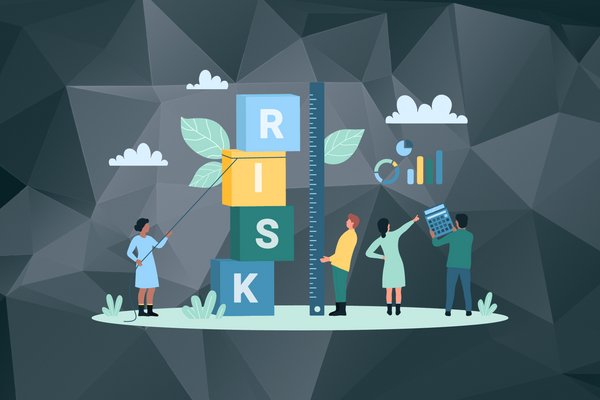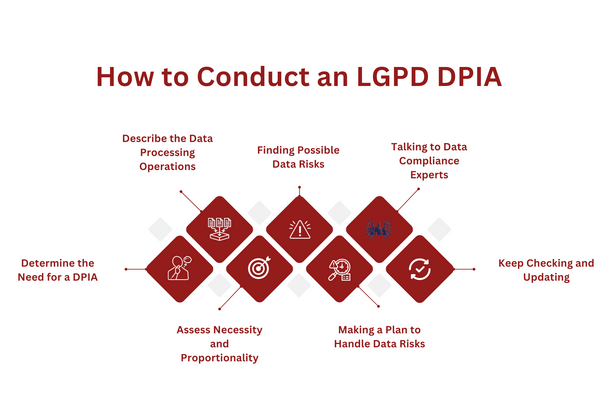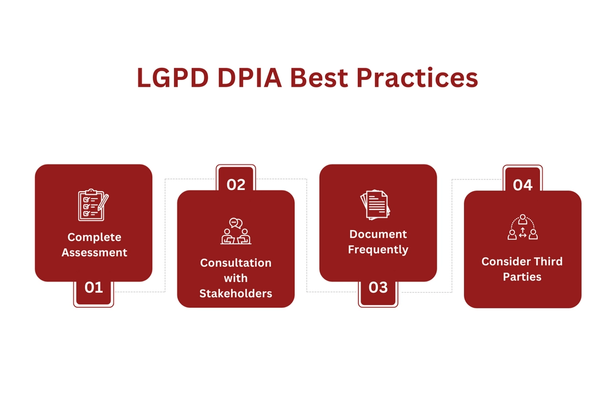
In this era of digital everything, businesses are facing yet another challenge – protecting sensitive data. Enter LGPD DPIA! It sounds like a secret code, doesn’t it? In essence, it is Brazil’s answer to safeguarding critical business information and ensuring we treat it carefully.
But don’t let these complicated acronyms scare you — this easy-to-follow guide will lift off your voyage into a world where compliance with privacy laws becomes as simple as ABC!
We’ll provide practical steps towards undertaking an effective LGPD Data Protection Impact Assessment for Brazilian regulations, ensuring the safety of all consumer data.
Let’s dive right in.
Key Takeaways
Data Protection Impact Assessments (DPIAs) help businesses identify and address data risks in line with Brazil’s LGPD regulations.
To carry out a DPIA, it is crucial for businesses to maintain communication within their teams, document the steps involved, and diligently review their efforts.
Captain Compliance is your partner on this journey, ensuring that businesses strictly follow the rules outlined by LGPD when dealing with data.
What is a DPIA?
What is a DPIA (2).png

A Data Protection Impact Assessment (DPIA) acts as a security check for data. Imagine you’re starting a project within your business. Before diving into it, it’s crucial to ensure everything is in order, don’t you think? Well, that’s what a DPIA does for data.
When businesses gather or use information, there are risks involved. These risks can potentially compromise an individual’s privacy or rights.
The purpose of a DPIA is to identify and address these risks so that appropriate measures can be taken to protect the data and prevent any issues.
In accordance with Brazil’s data protection law called LGPD, DPIAs hold importance, especially when considering the potential LGPD fines for non-compliance.
They play a role in ensuring that businesses respect LGPD rights and maintain the security of their data.
Therefore, if a business is involved in activities that may pose risks around data handling, it is advisable for them to conduct a DPIA as a measure.
When is an LGPD DPIA Required to Do?
When it comes to data protection, not every action requires an examination. However, there are instances where businesses should exercise caution. This is where the LGPD DPIA comes into play.
According to Brazil LGPD, there are specific instances where a DPIA is required.
For example, the national data protection authority in Brazil has the authority to request that a business produce a DPIA report.
It’s also highly recommended to do a DPIA when processing high-risk data or high volumes of data.
LGPD DPIA Requirements
Every business needs to ensure the security of personal data. However, how can they be confident that they are taking the measures? In Brazil, the LGPD has established guidelines to address this concern. One of these guidelines is the DPIA.
This checklist will help you in ensuring that you handle data in a responsible manner. Now, let’s explore what components should be included in a DPIA:
Record of Data Processing
Both the controller and the operator are required to maintain a record of their use of data to keep a diary.
This diary serves as a documentation of the personal data you collect and how it is utilized. Why is this diary so significant? Well, sometimes businesses utilize data based on a concept known as ‘legitimate interest.’ In some cases, they must exercise caution.
The purpose of the diary is to demonstrate that they have justifications for using that data. In terms of this, the record functions like a promise.
It ensures that businesses are handling data responsibly and in compliance with LGPD regulations. This not only helps them adhere to the rules but also fosters trust among individuals.
Preparing the DPIA
When it comes to dealing with information, being prepared is crucial. According to the ANDP, businesses should create a DPIA (Data Protection Impact Assessment) even before they begin using any data. However, what if a business overlooks this step?
In case they start noticing risks associated with the data they handle, it is essential for them to promptly conduct a DPIA. Think of it as a safety measure that catches any issues before they escalate.
Moreover, if the ANPD raises inquiries or concerns, businesses must be well prepared to demonstrate their compliance by having their DPIA readily available.
Impact Report
Article 38 of the LGPD requires businesses to include a breakdown of the categories of data being collected by the business, such as names or purchase details. You must also explain how this data is obtained, whether through inquiries or from businesses.
However, there’s more to it than that. The article delves into the importance of measures taken by the business to ensure the security of the data subject.
Businesses should use passwords to safeguard the information and regularly update their computer programs to prevent hackers. Moreover, it is crucial to educate employees on personal data security practices.
On top of this, you should have a description of the steps taken to mitigate risks and protect personal data privacy in your business. These can include specific protocols, tools, or strategies that are deployed in order to maximize data security.
When everyone is well-informed about handling data, maintaining its safety becomes more manageable. Basically, a DPIA demonstrates a business’s dedication to taking all steps to protect information.
How to Conduct an LGPD DPIA
How to Conduct an LGPD DPIA.png

In the realm of data security, businesses are obligated to adhere to regulations, and using LGPD compliance software can facilitate this process.
Brazils LGPD provides guidance on safeguarding data, with one crucial requirement being the completion of a Data Protection Impact Assessment (DPIA). This assessment goes beyond LGPD compliance. It showcases a business’s commitment to protecting data.
Now, let’s delve into the process of conducting a DPIA in alignment with LGPD guidelines.
Determine the Need for a DPIA
Before a business decides to use data, it should consider whether conducting a Data Protection Impact Assessment (DPIA) is necessary.
If using the data could potentially lead to problems or risks for your consumers, conducting a DPIA becomes crucial.
Describe the Data Processing Operations
You must address questions such as, “What kind of information are we gathering? Where does it originate from? Where will we securely store it?”
This stage is like sketching out a strategy, enabling everyone to grasp the business intentions regarding the data they collect. By being transparent about all this, businesses exhibit trustworthiness while also preparing themselves for stages of the DPIA.
Assess Necessity and Proportionality
Here, businesses have the responsibility to provide reasons for processing data. They are required to address queries such as, “What’s the necessity behind this data processing?” and “Are we handling an appropriate quantity of data?”
This ensures that data processing is not only crucial but also aligned with the intended objective, which helps limit risks.
Finding Possible Data Risks
During this stage, businesses take on the role of detectives. You must carefully examine your systems to identify any vulnerabilities that may lead to data loss or unauthorized access.
You must ask questions such as, “Is our stored data adequately protected?” “Are there any entry points?” or “Are we securely sharing data?”
By identifying these issues, businesses can develop strategies to address and correct them. This proactive approach ensures the safety and security of everyone’s information.
Making a Plan to Handle Data Risks
Once businesses are aware of the risks associated with their data, it becomes crucial for them to develop a compliance plan. This plan is aimed at safeguarding the data and ensuring its security. You must employ compliance solutions to fortify the protection of your customer’s data.
Additionally, educating your team members on data-handling practices is a part of this plan. In some cases, seeking guidance from experts in the field might also be considered.
Ultimately, the overarching objective is to ensure the safety of everyone’s data while promptly addressing any issues that arise.
Talking to Data Compliance Experts
Ensuring the safety of data can be a daunting task. That’s why businesses often engage in conversations with experts like Captain Compliance, who have knowledge about maintaining data security. We can offer custom strategies and solutions for handling data.
By engaging in these discussions, businesses ensure that they are adhering to the regulations outlined by LGPD and taking all precautions to protect their data.
Keep Checking and Updating
The field of data undergoes frequent changes, and new risks may emerge unexpectedly. For this reason, there is a need for businesses to regularly review and update their Data Protection Impact Assessments (DPIAs). This practice enables them to stay proactive and ensure the security of data.
LGPD DPIA Best Practices
LGPD DPIA Best Practices.png

The LGPD is not just a regulation to follow. Rather, it’s a commitment that businesses make to demonstrate their concern for individual data. Let’s delve into the steps involved in turning this commitment into reality by using real-world examples to provide an understanding:
Complete Assessment
The first step in implementing the LGPD is to conduct a complete assessment of your organization’s data processing activities. This involves identifying and documenting all personal data that you collect, store, process, or share.
On top of that, you must analyze any security measures you take, any risks you may have, and methods you are taking to mitigate those risks.
Sufficient Consultation with Stakeholders
Engage in conversations with all individuals involved, ranging from the IT employees to the consumer.
This can involve conducting interviews, surveys, or workshops to gather information and opinions on data processing activities. It is crucial to understand the perspective of all stakeholders so that you can accurately assess risks and identify areas for improvement.
Document Frequently
Document your data processing activities frequently and comprehensively. This includes keeping records of the types of personal data you collect, the purposes for which it is used, how long it is retained, who has access to it, and any transfers outside of Brazil.
By documenting this information regularly and thoroughly, you are demonstrating accountability and providing yourself with a clear reference point for future audits or inquiries from regulators.
Consider Third Parties
This means thoroughly vetting your third-party service providers, ensuring they have appropriate security measures in place, and clear data processing agreements. Additionally, you should regularly review the contracts with these third parties to ensure ongoing compliance.
Closing
Navigating the world of corporate compliance and data privacy can sometimes feel like solving a puzzle. However, the good news is you’re already ahead of most people.
Once you grasp the importance of DPIAs (Data Protection Impact Assessments) and embrace the practices associated with them, you’re already on your way to achieving success. What comes after comprehension? It’s putting that knowledge into action.
This is where Captain Compliance comes in, offering businesses the option to outsource compliance tasks. Think of us as your partner who can help you with your data protection journey, offering top-notch compliance services.
Whether it involves setting up a DPIA, providing consultations on data risks, or ensuring compliance with LGPD requirements, Captain Compliance has your back. Reach out to us today!
FAQs
What is the primary purpose of a DPIA under LGPD?
According to the LGPD, conducting a Data Protection Impact Assessment (DPIA) helps businesses identify and reduce risks related to data handling.
The main goal of this assessment is to ensure that businesses make an effort to protect data privacy, especially in situations where there is a potential threat to it.
Considering conducting a DPIA? Let Captain Compliance guide you through the process!
How often should a business review its DPIA?
A Data Protection Impact Assessment (DPIA) should not be seen as a one-off activity. It is essential for businesses to consistently evaluate and revise their DPIAs. This becomes especially important when they start using data in ways or make changes to how they handle information.
Need assistance in reviewing your DPIA? Check out our guide!
What are the penalties for non-compliance with LGPD?
Failing to adhere to LGPD regulations can lead to penalties. Businesses may be obligated to pay a fine of up to 2% of their earnings in Brazil.
The maximum penalty they could face for each violation is 50 million BRL. In addition, their errors could become knowledge, potentially damaging their reputation.
Learn more about LGPD fines here.
Are there any tools to help businesses with LGPD compliance?
Absolutely, there are compliance solutions like Captain Compliance that can help businesses comply with LGPD regulations. These resources provide assistance in terms of monitoring data, assessing risks, and managing permissions.
Looking for the right tools for LGPD compliance? Check out our guide here!